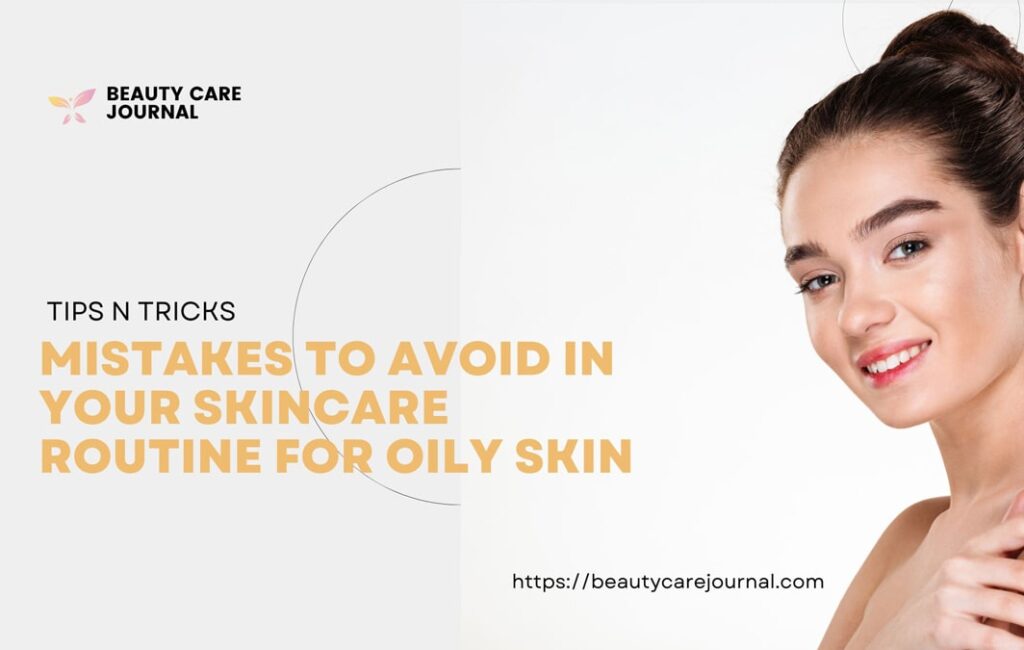
Isn’t it annoying to have oily skin? Regardless of what you do, those troublesome oil glands continue to produce. But don’t worry, today we’ll look at some of the most frequent mistakes people make in their skincare routine for oily skin, as well as how to prevent them. Let’s get started.
Understanding Oily Skin
Oily skin produces an overabundance of sebum, resulting in a glossy complexion and enlarged pores. Understanding your skin type is essential for developing an efficient skincare regimen that addresses its specific demands.
Common Mistakes in Your Skincare Routine for Oily Skin
# 1. Skipping Moisturizer
One common myth concerning oily skin is that it doesn’t require moisturizer. This could not be further from the truth! Moisturizing is crucial for all skin types, including oily skin. When you don’t use moisturizer, your skin may overcompensate and produce even more oil. Choose a lightweight, oil-free moisturizer to keep your skin nourished without clogging its pores.
#2. Cleansing Your Face Too Much
It’s tempting to wash your face several times a day to get rid of the greasy sensation, but overwashing can deplete your skin’s natural oils, leading to increased oil production and irritation. Wash your face twice a day using a mild cleanser made for oily skin.
# 3. Using Products That Are Too Harsh
When it comes to cleansers, avoid using products that include harsh substances like alcohol or sulfates. While they may briefly give you a squeaky-clean sensation, they can actually deplete your skin’s natural moisture barrier, leading it to create more oil. Look for moderate, non-comedogenic formulations instead.
# 4. Skipping Sunscreen
Sunscreen is a must-have part of any skincare routine, regardless of skin type. It not only protects your skin from damaging UV rays, but it also helps to prevent premature aging and lowers the chance of skin cancer. Choose a broad-spectrum sunscreen with at least SPF 30, and reapply every two hours, especially if you’ll be spending time outside.
# 5. Forgetting to Exfoliate
Exfoliation is essential for eliminating dead skin cells and unclogging pores, especially for people with oily skin prone to acne. However, over-exfoliation can be harmful, so exfoliate no more than 2-3 times per week with a moderate exfoliator containing chemicals such as salicylic acid or glycolic acid.
# 6. Not Using a Toner
Toners aid in removing any leftover debris, oil, or makeup after cleaning while also regulating the skin’s pH. Look for a mild toner that contains witch hazel or niacinamide to help decrease oil production and reduce the appearance of pores.
# 7. Picking at Your Skin
Picking at your skin may cause irritation, infection, and even scars. We’ve all done it at some point. Leave those pimples alone and instead use a spot treatment with chemicals like benzoyl peroxide or tea tree oil.
# 8. Using Heavy Makeup
Thick, creamy foundations and concealers can aggravate oily skin and clog pores, resulting in outbreaks. Choose oil-free, non-comedogenic products that will not smother your skin, and be sure to remove your makeup completely before bed.
# 9. Neglecting Regular Skin Checks
Last but not least, make sure to evaluate your skincare regimen on a regular basis and make any necessary changes. Our skin’s demands vary over time, so what worked for you once may not work forever. Pay attention to how your skin reacts to different products and adapt accordingly.
Effective Skincare routine for Oily Skin
- Clean carefully, avoiding strong scrubbing and abrasive instruments.
- To avoid clogged pores, use oil-free, non-comedogenic products.
- Exfoliate with salicylic acid or light chemical exfoliants to eliminate dead skin cells and clear pores.
- Apply a clay mask once or twice a week to remove excess oil and purify pores.
- Prioritize consistency in your skincare routine and be patient for results.
To summarize, taking care of oily skin can be difficult, but by avoiding these frequent errors and following a regular skincare regimen adapted to your skin’s demands, you can attain a healthier, more balanced complexion. Remember, consistency is essential, so stick to it and you’ll see results in no time!
FAQ (Frequently Asked Questions)
1. How often should I wash my face if I have oily skin?
Over washing is a typical error among those with oily skin. Washing too regularly might remove natural oils, resulting in increased oil production. It is ideal to wash your face twice a day, in the morning and evening, with a mild cleanser designed for oily skin.
2. Should I skip moisturizer if my skin is already oily?
Many people who have oily skin make the mistake of not using moisturizer. Even oily skin needs moisture, and missing a moisturizer can worsen oiliness. Choose oil-free, noncomedogenic moisturizers that will not clog pores while still providing moisture.
3. Can I use harsh exfoliants to control oiliness?
Using severe exfoliants, such as scrubs with coarse particles, can be harmful to oily skin. These solutions can remove too much oil, causing discomfort and perhaps increasing oil production. Instead, use light chemical exfoliants such as salicylic acid to clear pores without overdrying.
4. Is sunscreen necessary in a skincare routine for oily skin?
Regardless of skin type, failing to apply sunscreen is a typical error. Sunscreen protects the skin from damaging UV radiation, preventing premature aging and skin damage. To avoid blocking pores, use oil-free, non-comedogenic sunscreens designed particularly for oily skin.
5. Is it okay to pop pimples or pick at blemishes?
Picking at pimples is an absolute no-no for oily skin. It can cause irritation, transmit bacteria, and leave scars. Instead, treat blemishes with specific spot treatments using chemicals like benzoyl peroxide or tea tree oil, and avoid picking.
6. Can I manage oily skin on my own, or do I need professional advice?
Those suffering from oily skin frequently fail to seek expert help. A dermatologist or skincare specialist can provide specific advice and treatments to help you control oiliness successfully. If you’re having trouble managing oily skin on your own, don’t be afraid to seek professional help.
7. Are all skincare products part of a skincare routine for oily skin?
The assumption that all skincare products are suitable for a skincare routine for oily skin is a frequent fallacy. Some cosmetics, particularly those designed for dry or normal skin, may be overly thick or comedogenic for oily skin. Look for products branded “oil-free,” “non-comedogenic,” or “suitable for oily/acne-prone skin” to guarantee they won’t aggravate oiliness.


